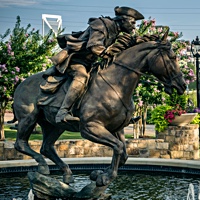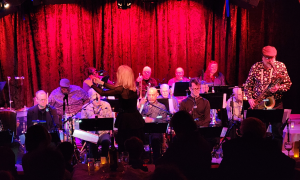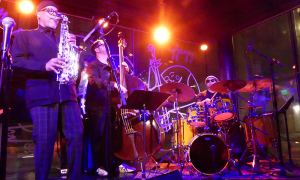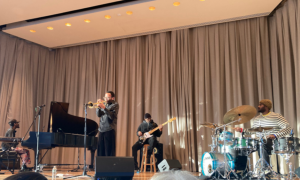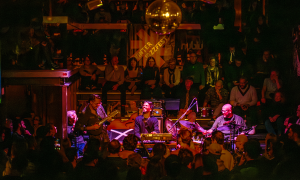Home » Jazz Articles » Live Review » Branford Marsalis at the Knight Theater
Branford Marsalis at the Knight Theater

Courtesy Luis Luque
Romare Bearden Revealed Knight Theater
Charlotte, North CarolinaMay 16, 2023
On September 3, 2003, Grammy Award winning saxophonist, Branford Marsalis released Romare Bearden Revealed. The album was a collaborative effort with the National Gallery of Art in Washington DC.
The gallery's exhibit, The Art of Romare Bearden, was a homage to Bearden (1911-1983), whose birthplace is Charlotte, North Carolina. The City of Charlotte also named a park after Bearden in 2013, located in the heart of the Uptown area. While Bearden was alive, Marsalis spent time with him and also owns two of his paintings.
Fast forward almost twenty years later. Lonnie Davis, Jazz Education Network president and JazzArts Charlotte (North Carolina) CEO, made a request to Marsalis to present a performance of Romare Bearden Revealed in Charlotte. The Mint Museum opened an exhibit entitled Bearden/Picasso Rhythm and Reverberations which was held from February 11 -May 21, 2023, and also co-partnered the event with JazzArts Charlotte to create a musical tribute to Bearden—a laudable joint effort for the community.
Marsalis said yes. There was only one problem.
To a packed audience at the 1,192-seated Knight Theater, Marsalis jokingly admitted that he had thrown out the original music a while back, thinking that it would not be used again.
The audience laughed in appreciation of Marsalis' humor and his unpretentious demeanor, which throughout the night was enlivening.
A little about Romare Bearden. Bearden was a celebrated artist and writer, known for capturing the everyday life of African Americans using such techniques as the collage method. Daniel Matlin says of Bearden's work that, "In the snipping, tearing, splicing, and pasting that constituted his new medium, critics recognized, and art historians have continued to see, an artistic practice peculiarly expressive of the complex juxtapositions and abrupt shifts of tempo that defined twentieth-century African American life."
During Bearden's life and time in Harlem New York, he enjoyed a convivial friendship with jazz composer/bandleader/pianist Duke Ellington and other musicians of the Harlem jazz scene. In 1980, Bearden even named a piece after Ellington, Bessie Smith, and Louis Armstrong entitled, "Homage to Duke, Bessie and Louis." Several of his works depicted jazz and blues themes.
On Marsalis' album, Romare Bearden Revealed, many of the compositions were named after Bearden's works, such as "Of the Blues: Carolina Shout." On the night of the performance, Marsalis brought to the stage Joey Calderazzo on piano, Russell Gunn, trumpet, Justin Faulkner, drums, J.C Martin, guitar, and on acoustic bass, Eric Revis.
The performance began with Ellington's "I'm Slappin' Seventh Avenue" (With the Sole of My Shoe)—released in 1938 and available on the album Duke Ellington and His Orchestra, Volume 2 (Circle, 1943). The audience listened to their first solo of the night from Marsalis and in virtuoso effort, he illuminated why he is a Tony nominee, NEA Jazz master, and was recently awarded an honorary doctorate by Duke University,
The show moved on to a selection that highlighted Bearden as a songwriter. He helped write "Seabreeze," sung by Billy Eckstine, which became a success in 1954 and was later sung by Tito Puente. Marsalis and the band re-contextualized it as a smooth sailing ballad/bolero highlighted with a warm trumpet solo by Gunn.
Bearden provided the illustration for the piece "J-Mood," from the 1986 album of the same name released by older brother, Wynton Marsalis. In the piece, Marsalis switched to a lower registered sax, providing another burning solo, showcasing his top-tier musical adroitness.
J.C Martin also presented several steady solos throughout the night, specifically exemplified on "Autumn Lamp," where a Dobro metallic guitar captured a special sonic ethos reflective of Bearden's time period.
Another crowd favorite was "Jungle Blues' ' originally written by Jelly Roll Morton in the 1920's. The Southern, bible-belt audience noticeably rocked and head nodded, deeply pleased by the blues/gospel feel of the piece. There were some special moments with muzzled trumpeting from Gunn, and juke joint/dirt road churchy piano comping from Calderazzo.
Faulkner and Revis offered impeccable time-keeping throughout the night and provided good solos. As an encore requested from the crowd, the band returned to the stage, performing the 1931 Ellington classic, "It Don't Mean a Thing (If It Ain't Got That Swing)."
Marsalis noted his regret at not having had the time to add a visual component of Bearden's work to the performance. Projections of paintings of Bearden's work, which Marsalis' album references, would have been enlightening as to why Bearden's work was so important to the genre of jazz.
In collaboration with great performance groups such as North Carolina's theater group Concrete Generation, owned by playwright Quentin Talley who created Miles and Coltrane: Blue (.), or the Alvin Ailey Dance Theater, this performance could evolve in entirely new directions to honor Bearden.
Tags
PREVIOUS / NEXT
Branford Marsalis Concerts
Support All About Jazz
 All About Jazz has been a pillar of jazz since 1995, championing it as an art form and, more importantly, supporting the musicians who make it. Our enduring commitment has made "AAJ" one of the most culturally important websites of its kind, read by hundreds of thousands of fans, musicians and industry figures every month.
All About Jazz has been a pillar of jazz since 1995, championing it as an art form and, more importantly, supporting the musicians who make it. Our enduring commitment has made "AAJ" one of the most culturally important websites of its kind, read by hundreds of thousands of fans, musicians and industry figures every month.





